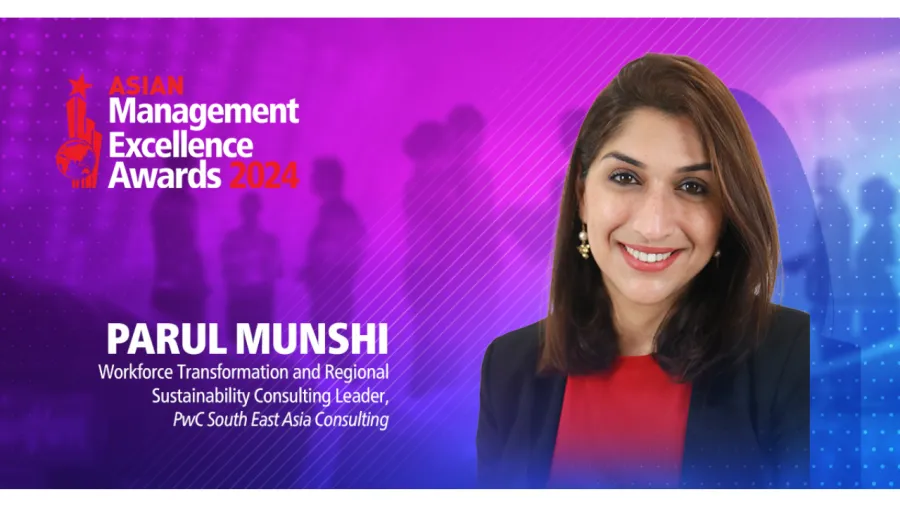
PwC’s Parul Munshi on unlocking sustainability and DEI opportunities: Utilise data-driven approaches, cultural embedding and link leadership performance to outcomes
Parul emphasises leaders' pivotal role in transforming businesses through sustainability for differentiation and value.
Against the backdrop of complex global developments, the need for business reinvention has never been more pronounced. Amongst a number of factors spurring the urgent need for business transformation, sustainability has undoubtedly become one of the biggest drivers. Building and growing a thriving sustainable business has emerged as one of the top priorities for leaders, who need to display strong and decisive leadership.
Parul Munshi, Workforce Transformation and Regional Sustainability Consulting Leader at PwC South East Asia Consulting, sheds light on the role of leaders in navigating the complex waters of sustainability and building stronger purpose-led businesses.
As Partner, Parul spearheads the sustainability practice in the region. She has been guiding clients in India and Southeast Asia, assisting in the development of future-of-work programmes, reskilling strategies, leadership initiatives, and operational transformations. As the global proposition leader for PwC's Sustainability-Workforce offerings, Parul is an advocate for purpose-led business. She also leads PwC’s Diversity, Equity, and Inclusion (DEI) agenda in Southeast Asia, emphasising the importance of equity and inclusion in organisational success.
In this insightful conversation, Parul - who served as a judge in the inaugural Asian Management Excellence Awards - shares her perspectives on sustainability, diversity, equity, and inclusion, along with her observations on the prevailing management trends in the region.
With sustainability becoming one of the main focuses of most organisations today, how do you think effective management can affect their performance and compliance in this facet?
Leaders play a crucial role in setting the ambition for sustainability transformation in their organisations. There are common characteristics amongst businesses that have truly seized the opportunity to embark on transformative change on this front.
Firstly, they comprise leaders who see sustainability as a value-creation opportunity that will differentiate their organisations from the competition. Secondly, the leaders at the helm of these firms invest in creating agency around transformation by upskilling themselves and their teams, setting bold sustainability targets and incentivising teams to deliver against those targets.
You are leading PwC’s DEI agenda in Southeast Asia. What would you say are the region’s biggest obstacles in this realm and what kind of support do you usually provide to consultants or clients to improve their outcomes?
We live in a hugely diverse and demographically rich part of the world. Our opportunity to reap benefits from this demographic dividend is, however, often stymied because of inherent societal inequalities that we need to address as leaders.
In Southeast Asia, gender orientation continues to dominate the focus of organisational DEI initiatives. Increasingly, we see a number of organisations focusing on powering a multi-generational workforce, including implementing new and innovative talent management practices to engage older employees.
I see some areas for greater impact in this space, starting first with data and transparency. Organisations can be far more data-driven in their approach to tackling DEI challenges; a one-size-fits-all approach does not work. Secondly, successful DEI initiatives are those that move away from a “programmatic” view to embedding inclusion deep in the organisational psyche. Finally, it is imperative to link leadership performance and incentives to tangible DEI outcomes. We work with leaders across all these dimensions, especially to create sustained outcomes through culture and ways of working that are based on the foundations of psychological safety and inclusion.
Given your extensive experience in consulting, what would you say are the biggest management trends in the region at the moment and how can executives leverage this trend to improve leadership?
Our recently launched PwC’s 27th Annual Global CEO Survey - Asia Pacific – which canvassed the views of 1,774 CEOs in Asia Pacific – cited that 63% of APAC CEOs polled believe their businesses will not be economically viable in the next decade if they continue on their current trajectory. This is despite 97% of Asia Pacific CEOs already taking at least some steps towards transformation over the last five years.
This significant transformation will require courageous and bold leadership to steer society and business through what is predicted to be a challenging and defining decade ahead.
Being a part of the esteemed panel of judges for the inaugural Asian Management Excellence Awards, what key characteristics stood out about the entries in terms of their impact on Asia’s business management landscape?
It has been a fascinating experience to get a first-hand view of how leaders across APAC are embarking on their own business reinvention journey. I’ve also been heartened by how businesses are going about their transformation with a strong people focus. In nearly all the participant stories, I saw an increasing reflection of purpose-led leadership with a far more humanistic style of leadership at the helm.
By: Parul Munshi, Workforce Transformation and Regional Sustainability Consulting Leader, PwC South East Asia Consulting









![Cross Domain [Manu + SBR + ABF + ABR + FMCG + HBR + ]](https://cmg-qa.s3.ap-southeast-1.amazonaws.com/s3fs-public/styles/exclusive_featured_article/public/2025-01/earth-3537401_1920_4.jpg.webp?itok=WaRpTJwE)









 Advertise
Advertise


